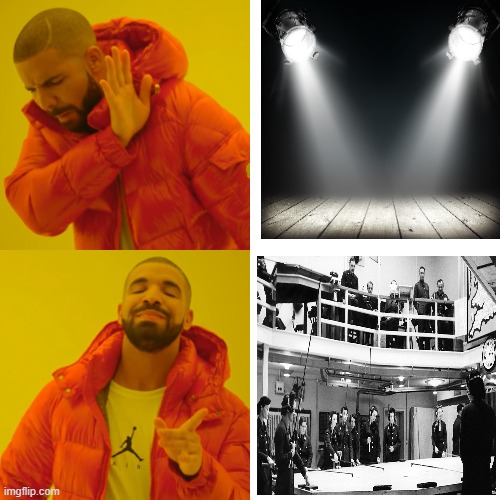(Editorial Note: Monday's post is here and yesterday's is here.)

The Error: Only The Table Matters
Readers that have been here for a few weeks will recall my series on time and downtime. (It starts here, for those catching up.)
This error parallels, and synergizes, with One True Party; they reinforce each other.
You can implement strict timekeeping, and the accountability for its consequences, but without allowing for players to engage in action away from the table the benefits are--at best--muted.
You will see characters rotate depending upon availability, but otherwise a lot of the dysfunction of One True Party remains. That Narrative Logic (represented by the spotlight) and its narcissism and solipsism becomes difficult to resist because you have no compelling force pushing you away from that dysfunction.
If only what happens at the table matters, then the efforts of other parties will be confined by those players able to be heard when that session goes down- or it gets thrown back on the Dungeon Master (DM) and he is again forced out of his proper role as disinterested neutral Referee and arbiter to play the role of Antagonist- and that promotes the Frustrated Novelist Syndrome dysfunction in turn (because why allow that work to be wasted).
There is a remedy, and once the DM in particular sees it no man worth a damn will ever go back.

The Correction: Downtime Actions Diplomacy Style
The use of strict timekeeping and accounting for same is not confined to making certain that there is an opportunity cost in terms of time for actions taken at the table. It also allows for the players to assume the roles of powerful Patrons (NPCs that may aide PCs or their opposition) in the campaign--rulers, demigods, dragons, warlords, merchant princes, whatever it is--and do the "plotting" that the DM is commonly expected to do.
This is in addition to, and therefore separate and distinct from, any character played at the table. By allowing players in the campaign to do this, the DM reduces his workload and turns the campaign into one that is truly a game with competing players pursuing divergent and conflicing objectives. In this manner, playable scenarios will arise emergently as consequences of Patron interactions and the effects of actions done in one place will be felt in others (symbolized by UK Fighter Command HQ above).
Furthermore, those players need not play at the table AT ALL.
The campaign can accept participation from those who, for whatever reason, cannot be present at the table if this is done. The technology back in the 1970s permitted this, but it was not speedy or convenient; snail-mail, telephone calls, and meetings between sessions to chat were the go-to options.
That is not the case now. Today we have services such as Discord (which is ideal for faciliating all of this with ease), email providers are plentiful (and many are free), Direct Messaging is commonplace in various forms, and online chats (text and voice alike) make it easy to not only talk but to record conversations for later review.
A DM could easily have a score or more players participating in a campaign at any time, even if only half or less show up at the table, due to using player control of Patrons to drive the big picture of the campaign.
When a group of PCs decide to confront that Patron? Maybe, with enough warning, the player running that Patron can call in from afar or lurk in chat to tell the DM privately what that Patron does- assuming that the player isn't already there playing one of the characters going after the Patron.
By allowing play to expand beyond the table the DM furthers the creation of a living world that operates under its own power, that does not care if the PCs succeed or fail, and thus when players do succeed or fail it is by their merit or fault alone.
This means that accepting the necessity of Player Versus Player gameplay is required. The DM did not wipe the party. Bob, playing the Lich Queen of Reno, wiped the party- and the DM ensured that it was all done by the rules of the game. You can see right here how, and why, that Narrative Logic does not apply to RPGs.
Remeding these errors restore the competitive element of the medium. Restoring the competitive element of the medium solves the dysfuntional play problems plaguing the medium and the hobby.
No comments:
Post a Comment
Anonymous comments are banned. Pick a name, and "Unknown" (et. al.) doesn't count.